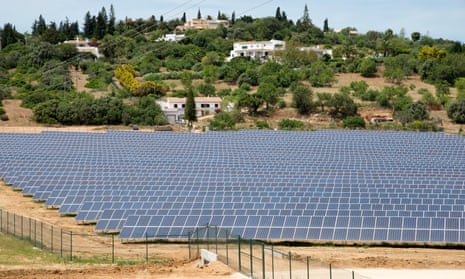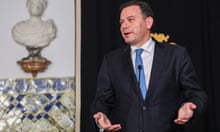Portugal has been among Europe’s more ambitious countries in terms of climate action, but the rise of the far right in recent elections could threaten the positive steps the country has taken.
At the end of 2023, Portugal broke records as it went for six consecutive days relying solely on renewable energy. But national elections in March this year marked a significant shift in the political landscape, with the far-right party Chega (Enough) making a major breakthrough. Having more than quadrupled its number of MPs from 12 to 50, Chega holds considerable sway in the 230-seat parliament, where it could influence legislation.
Although it won the election, the centre-right Democratic Alliance, led by the new prime minister, Luis Montenegro, won only 80 seats, while the centre-left Socialist party, which has governed Portugal for the past eight years, secured 78.
In June, European citizens cast their votes for the new European parliament. There have been predictions of the far right aligning with traditional rightwing factions, posing a threat to climate and environmental policies.
Chega had hoped to be part of the government, but Montenegro declined the offer. The far-right party was also eager to see Montenegro choose a climate denier for agriculture minister. One such candidate was Eduardo Oliveira e Sousa, from the Democratic Alliance – and a former head of the Portuguese Farmers Confederation – who was a strong supporter of recent protests by farmers over funding distribution and EU-wide rules on sustainable farming. He claimed during the campaign that the country had lost investment for “false climate reasons”, arguing that “extreme phenomena have always existed”.
In fact, many Portuguese farmers have experienced first-hand the effects of water scarcity and rising temperatures on their crops, and so are deeply concerned about climate breakdown. Perhaps with this in mind, Montenegro appointed heavyweights from the European parliament to lead key ministries including agriculture and fisheries, and environment and energy.
While these appointments were largely welcomed by environmentalists, concerns lingered over the government’s focus on energy at the expense of broader climate action and environmental protection.
The decision to rename the ministry of environment and climate action as the ministry of environment and energy raised eyebrows among leading environmental groups, who fear a shift away from nature conservation and biodiversity.
They have condemned decisions including eliminating the position of secretary of state for nature conservation, and moving responsibility for forests to the ministry of agriculture,, which they fear could lead to more of a focus on productivist management than conservation.
The new agriculture minister, José Fernandes, has been welcomed by farmers, who had accused his predecessor of mismanagement leading to delays in the payment of EU funds. Fernandes has said he plans to invest more funds from the European Investment Bank in agriculture and has been outspoken in opposing “a green radicalism and a punitive ecology that harms farmers”, arguing that addressing climate change is crucial but should be gradual.
Also on the new government’s agenda is speeding up the transition to clean energy, but unlike the previous government, green hydrogen and lithium projects are not specifically named.
It is thought unlikely that the far right will be able to force a green backlash into the Portuguese national agenda. Chega’s main focuses are corruption, wages, migration and housing, reflecting voters’ priorities.
But environmentalists fear a focus on technology and economy could backfire and undermine the climate transition. They are calling on the government to uphold Portugal’s 2045 goal for reaching carbon neutrality, rather than delaying it until 2050 as some groups are pushing for.
The rise of the far right in Portugal serves as a warning to other countries in the run-up to the European elections. Keeping strong environmental goals is crucial not only to mitigate the effects of the climate crisis, but also to uphold and defend democratic principles. If politicians forget that, the continent could be set on a dangerous trajectory.










